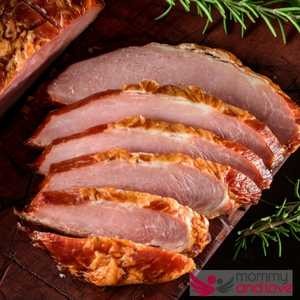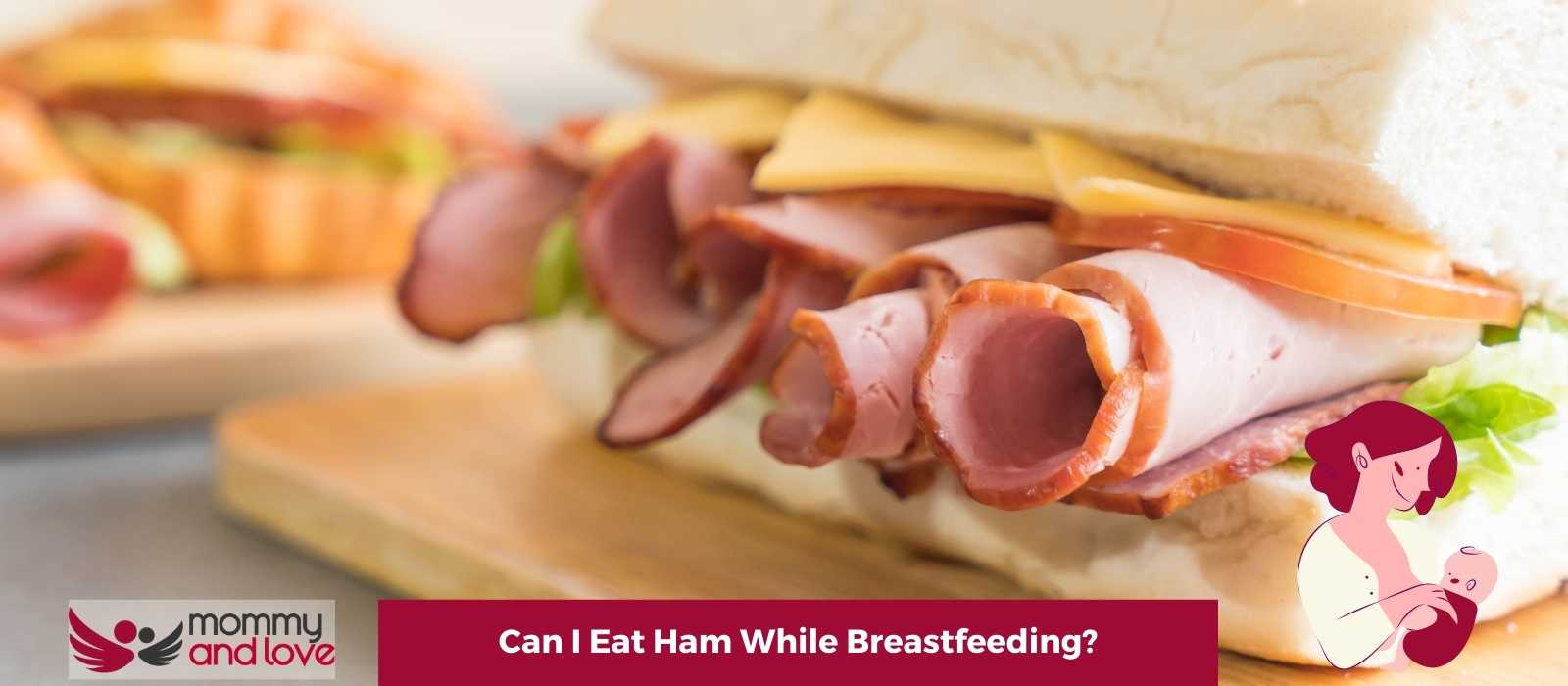Moms love comfort foods, and for some breastfeeding moms that means a nice plate of ham. While we all know that pregnant women must avoid listeria (as well as any uncooked or undercooked meat or seafood) — many don’t know that breastfeeding moms should be wary as well. This is an informative blog on the benefits and risks of eating ham and deli meat while breastfeeding as well as foods you want to avoid while breastfeeding.
Is It Safe for Breastfeeding Mothers to Eat Ham?
Ham is not one of the foods you need to avoid while breastfeeding. So yes, you can eat ham even if you are breastfeeding.
Ham is a safe food to eat during lactation. Deli meats like ham are put through a process called “curing,” which helps kill any bacteria that may be present in meat.
However, the risk of listeria is still present when you eat deli meat, so it’s important to keep that they are steaming hot when you cook them so any present listeria bacteria is killed.
Health Benefits of Eating Ham While Breastfeeding

Ham is an excellent source of protein and iron, especially if you are breastfeeding. This meat is also a good source of B vitamins, which may help with fatigue.
Ham can be eaten in moderation while breastfeeding unless you have an allergy to it or your baby has food allergies.
Health Concerns About Eating Ham While Breastfeeding
Due to some health concerns, ham is among the foods that many mothers avoid while breastfeeding.
Ham is often cured with nitrates and/or nitrites. Nitrates can turn into nitrites within the body and may affect the way your baby’s blood carries oxygen. This can lead to methemoglobinemia, a condition that causes your baby’s blood to lose its ability to carry oxygen properly through the body.
How Much Ham Can You Eat While Breastfeeding

While breastfeeding, you can safely eat up to 2-3 servings of ham each week. A serving is one slice of ham or roughly 1 ounce.
Like other meats, it’s important to avoid deli meats, unless you are certain that the meat has been steamed prior to being packaged.
You have carefully avoided deli meat for nine months, you can still avoid deli meat while breastfeeding if you can help it.
Can Ham Affect Breast Milk?
If you are breastfeeding and have enjoyed a ham sandwich or meal while nursing, you should not worry that it will affect the quality of your breast milk.
There is no evidence to suggest that eating ham will do anything negative to the quality of your breast milk. As long as you are eating a proper diet and getting good nutrition while breastfeeding, eating ham will only help add protein to your diet.
Does Eating Ham Increase Breast Milk Supply?
There’s no conclusive evidence to suggest that ham affects breast milk production. However, most hams contain nitrates and are high in saturated fat which can potentially reduce and inhibit milk production so this is something to think about before you eat deli meat and other cold cuts.
If you are looking for ways to increase your breast milk supply, practice healthy eating habits and have a varied diet that consists of nutrient-rich foods, lean protein foods, whole grains, vegetables and fresh fruits.
Conclusion
Ham can be an excellent source of protein and iron in a mother’s diet. It’s also particularly important for nursing women because it can help them avoid anemia, which sometimes occurs when breastfeeding. However, certain foods can make a nursing baby fussy and ham might be one of them so a breastfeeding woman should always be careful. And if you want to look after your baby’s nutrition, you should have a well-balanced diet consisting of citrus fruits and vegetables.
If you can’t come up with a diet plan on your own, you can always talk to your healthcare provider or a health professional.
FAQ
Can Listeria Be Transmitted Through Breast Milk?
No, listeria and other bacteria in deli meat cannot be transmitted to breastfeeding babies through breast milk.
What Meats Can I Eat While Breastfeeding?
Although many nursing mothers worry about the foods they eat affecting their baby’s health, there are only a few types of food that are actually off-limits while breastfeeding.
Mothers who eat meat can continue to do so without any negative effects on their children. In fact, meat is an excellent source of protein and other nutrients that are essential for both mother and breastfeeding baby.
While you can eat rare beef, it is still important to make sure that the meat is cooked thoroughly to avoid the risk of food poisoning.
Nursing mothers should also avoid processed meats, such as bacon and sausage, as these can be high in salt and fat.
With a few simple precautions, mothers can enjoy all the benefits of eating meat without any adverse effects on their baby’s health.
Can I Eat Pork While Breastfeeding?
The good news is that you can eat pork while breastfeeding, cooked or uncooked. It’s healthy food for nursing mothers, and it can be eaten in moderation.
Pork is an excellent source of protein which is good for most breastfeeding mothers and their breastfed babies. It’s also a good source of iron and calcium as well. But pork should be eaten in moderation to avoid weight gain.
What Other Foods to Avoid or Eat In Moderation While Breastfeeding?
Here are a few foods and drinks to avoid while breastfeeding or should be consumed in moderation:
- Spicy foods are generally okay but you should still eat spicy food in moderation due to their strong flavor. There’s no evidence that spicy foods can cause any problem in a breastfed baby but it’s best to eat them in moderation. We’ve done a guide to jalapenos when nursing.
- If you couldn’t eat soft cheeses when you were pregnant, you can eat them now that there are only a few dietary restrictions for breastfeeding women. You can eat feta cheese when nursing.
- Hot dogs, little junk food, high-fat meats and other highly processed foods should be avoided due to their high sodium and preservatives content. These foods are bad for your own health as well as for your baby’s system. We’ve done a guide to hot dogs when nursing.
- Limit your caffeine intake (see our guide to caffeine and nursing) and drink nutritious milk instead. Avoid energy drinks completely.
- Gassy foods such as cruciferous vegetables and brussels sprouts can cause discomfort to a breastfeeding mother which can affect her ability to breastfeed.
- Unpasteurized cheese, cow’s milk and dairy products because of the presence of listeria bacteria in them.
- Regardless of how much alcohol you can drink, it is always recommended to err in the side of caution and avoid alcoholic beverages, whether you choose to drink eggnog when nursing or wine cooler when breastfeeding.
- Nuts which is among the most common food allergens, especially if you have a food allergy to them.
- Raw or undercooked eggs should also be avoided due to potential salmonella poisoning.
- Canned light tuna or other low mercury fish is a good substitute for eating fish with high mercury content. See our guide to tuna when nursing.
- Herbal supplements that are not approved by FDA can do more harm to you than good.
Most foods to avoid are those that are not healthy regardless if you’re breastfeeding or not. The Centers for Disease Control and the American Pregnancy Association have a complete list of foods to avoid eating during pregnancy and lactation.

This article was written by Sandra Baker – full time writer and the mother of four amazing kids (including twins!)
She’s also a breastfeeding counselor and has spent years helping new parents learn how to care for their children. When she’s not writing or caring for her children, Sandra likes to spend time reading and taking walks with her husband.




